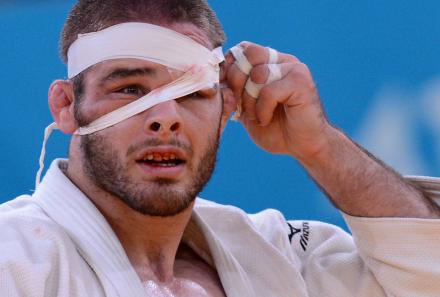Final Thoughts on the Olympics
- Marti Malloy was phenomenal, but boy did she ever get screwed.
- She threw her Russian opponent twice for Ippons that would later be waved off. And I have no idea how the first one turned in to a Yuko: the center judge called Ippon, and the corner judge that was in view of the camera called a Waza Ari. So, even if the other corner judge called no score (which would have been ridiculous), that should have come out to be a Waza Ari, minimum.
- Against her Hungarian opponent, I think the Hungarian went for full 4 min. and 50 seconds without making a throw attempt. How she didn't get penalized is beyond me.
- Shaherkani was able to become the first Saudi woman to ever compete in the Olympics. The assholes in charge of the IJF tried to prevent her from competing with a hijab (head covering), but I suspect the IOC twisted their arms until they changed their mind. Here are some fun facts about Shaherkani: she's 16 and she's not a black belt. That one kind of makes you wonder: issue one of the best female athletes said Saudi Arabia had to offer up, or were they trying to set something else up to show why they shouldn't send women into the Olympics? Anyhoo, she didn't win, but good for her for showing up.
 Travis Stevens' semifinal match against Bischoff was ridiculous... He got a small mouse right at the beginning, so they wrapped tape around his head a few times, partially obscuring his vision. Then he got a scratch on the bridge of his nose, so they wrapped another piece of tape around his head a few more times, further obscuring his vision out of that left eye. And now he looks like a mummy. Later in the match, I think he got poked in his one good eye.
Travis Stevens' semifinal match against Bischoff was ridiculous... He got a small mouse right at the beginning, so they wrapped tape around his head a few times, partially obscuring his vision. Then he got a scratch on the bridge of his nose, so they wrapped another piece of tape around his head a few more times, further obscuring his vision out of that left eye. And now he looks like a mummy. Later in the match, I think he got poked in his one good eye.
- That match got testy (teste?), too. I've never seen a ref demand that players shake hands in the middle of a match.
- Of course, this wasn't the worst tape job of the day: Ugo Legrande had a strip going in between his nose and his lip.

- American fans really showed up in this games. There seem to a been a ton of fans there.
- What's even better, the American team really showed up this year. Our first gold ever, a bronze, and two semifinal appearances. That's phenomenal. A lot of respect is due to our athletes and to Coach Jimmy Pedro, Jr. for their great work over the last several years.
- The Japanese, on the other hand, seem to be on the way down. Seven medals, with only one gold – and no golds for the men. Of course, they had more medals than we had participants, but it's not good by their standards.
- There were a ton of examples of bad refereeing in this Olympics, but the example that stands out most to me is this one: Nakai of Japan was thrown for Waza Ari with only the bottom of his butt touching the mat, as he rolled over his opponent (his opponent precluding even a possibility that his back could have touched the mat). What the hell?
- I have grown to really hate the music that they play at the start and end of all the matches.
- Was I just taught the wrong thing when I took my reffing class? nine times out of 10 when there's a score change, the match is stopped and referees conference. I thought that when there is a difference of opinion over the score, the procedure was supposed to go like this:
- Corner judges were to signal their desired score from a seated position.
- In the event that they both showed the same score, they would stand up to signal to the center referee that they agreed.
- in the event that they disagreed, they would effectively average the score between their respective scores and the center ref's score, and then rise signalling that average (unless the average was the same as the center ref's original score).
- For example, the center ref signals an Ippon, and the two corner refs think it was a Waza Ari. They signal Waza Ari and stand to let the center ref know that they agree.
- The center ref signals an Ippon, one corner ref signals a Waza Ari, the other corner of signals a Yuko. The judges average their score to a Waza Ari, and stand to signal this to the ref.
- The center ref signals a Waza Ari, one corner of signals an Ippon, and the other corner ref signals aYuko. Since the average is a Waza Ari (the center ref's score), the corner judges drop their signals and do nothing else.
- When the center ref sees that he's been overruled by the standing corner judges, he waves off his original score and signals the new score that the corner judges show.

0 comments:
Post a Comment